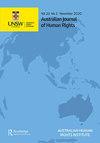通过另一种方式重新驱逐——“结构性驱逐”和1958年《移民法》(Cth)规定的基于性格的决定
Q1 Arts and Humanities
引用次数: 0
摘要
摘要2014年,联邦政府分两期对《1958年移民法》(以下简称《移民法》)进行了重大改革。第一个是将澳大利亚根据1951年《关于难民地位的公约》承担的义务改编为该法下的一系列成文定义。第二套改革扩大了该法案规定的“性格权力”,并建立了强制取消签证的制度。“保护”制度和“性格”制度的相互作用引发了大量诉讼,并造成了大量被视为“不受欢迎但无法回报”的人,他们被无限期移民拘留。本文总结了上级法院关于人格权和不驱回义务的裁决中出现的原则,并考虑了“建设性驱回”这一新生概念可能在这一领域发挥的作用。正如欧洲人权法院最近的裁决所阐述的那样,“建设性驱回”是指一个国家采取的迫使寻求庇护者接受遣返的做法。在与性格相关的决策中采用这一概念可能会迫使决策者和负责审查决定的法院更密切地考虑无限期拘留的前景,并将其适当评估为与强迫遣返相一致。本文章由计算机程序翻译,如有差异,请以英文原文为准。
Refoulement by another means—‘constructive refoulement’ and character-based decisions under the Migration Act 1958 (Cth)
ABSTRACT In 2014, the Federal Government introduced significant reforms to the Migration Act 1958 (the Act) in two tranches. The first involved adaptation of Australia’s obligations under the 1951 Convention relating to the Status of Refugees into a series of codified definitions under the Act. The second suite of reforms expanded the ‘character powers’ under the Act and established a regime of mandatory visa cancellation. The interaction of the ‘protection’ and ‘character’ regimes has generated a vast amount of litigation and created a sizeable population of people deemed ‘undesirable but unreturnable’, subjected to indefinite immigration detention. This article summarises the principles emerging from superior court decisions concerning character powers and non-refoulement obligations and considers the role that the nascent concept of ‘constructive refoulement’ might play in this area. As elaborated in recent decisions of the European Court of Human Rights, ‘constructive refoulement’ refers to practices adopted by a state that compel an asylum seeker to accept repatriation. Employing the concept in character-related decision-making may compel decision-makers, and courts charged with review of decisions, to have closer regard to the prospect of indefinite detention and assess it properly as being on a continuum with forced repatriation.
求助全文
通过发布文献求助,成功后即可免费获取论文全文。
去求助
来源期刊

Australian Journal of Human Rights
Arts and Humanities-History
CiteScore
1.30
自引率
0.00%
发文量
43
期刊介绍:
The Australian Journal of Human Rights (AJHR) is Australia’s first peer reviewed journal devoted exclusively to human rights development in Australia, the Asia-Pacific region and internationally. The journal aims to raise awareness of human rights issues in Australia and the Asia-Pacific region by providing a forum for scholarship and discussion. The AJHR examines legal aspects of human rights, along with associated philosophical, historical, economic and political considerations, across a range of issues, including aboriginal ownership of land, racial discrimination and vilification, human rights in the criminal justice system, children’s rights, homelessness, immigration, asylum and detention, corporate accountability, disability standards and free speech.
 求助内容:
求助内容: 应助结果提醒方式:
应助结果提醒方式:


